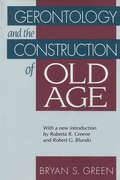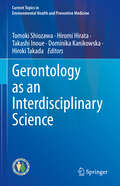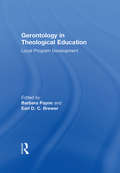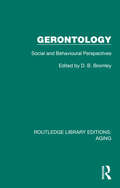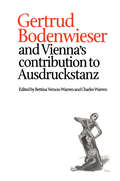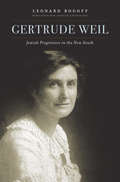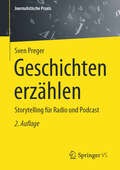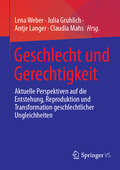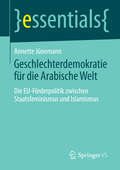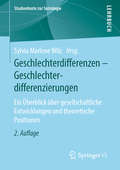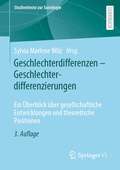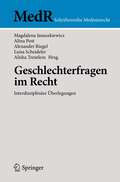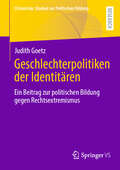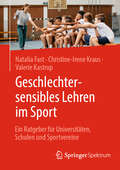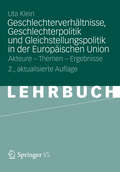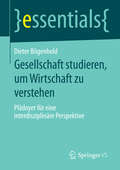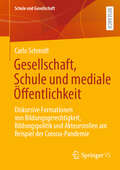- Table View
- List View
Gerontology and the Construction of Old Age
by Bryan GreenAlthough attitudes toward the aged and their care are inherent in any society, gerontology itself is a relatively recent field of study and practice. Gerontology and the Construction of Old Age applies the methods of discourse analysis and textual analysis to texts and documents in this newly evolved and eclectic fi eld. Green explores and identifies the literary methods and discursive regularities through which aging and the aged have been made into objects of study and treatment, and which together form a mode of knowledge production that will infl uence future texts in the field.Because such formats of representation limit rational diagnoses of problems and rational courses of ameliorative action, policy implications in the fi eld of gerontology are a major interest of this study. Another interest is methodological. Within the broader constructionist approach to social reality, Green takes the position of "constitutive realism": the notion that social reality is linguistically constructed, primarily in speech and writing.The book's two aims are to describe analytically the fi eld of gerontology. The field is important both for its growing academic presence and for its practical eff ects on discourse and policy concerning old age. It also hopes to help develop possibilities of inquiry associated with the linguistic, literary, and rhetorical turns of social science in recent years. Gerontology and the Construction of Old Age is a substantive investigation, at considerable theoretical depth, of gerontology itself, as well as a methodological treatise with broader implications for social science as it focuses upon the discourse of various professional fields.
Gerontology as an Interdisciplinary Science (Current Topics in Environmental Health and Preventive Medicine)
by Takashi Inoue Hiromi Hirata Hiroki Takada Tomoki Shiozawa Dominika KanikowskaThis book presents the latest evidence-based approach in diagnosis and management of the aging of both individuals and society from a gerontology perspective. Amid significant demographic changes such as aging and longevity, one crucial concern is how to live a long healthy life and how community and company can support it. Thus, this book aims to educate society on this vital issue and promote research that integrates the humanities and sciences that welcomes the elderly into an economic market and considers them the new social asset. The book is organized into three themed parts; Environmental Health, Culture/Society in Gerontology, and Preventive Medicine. Chapters provide easy-to-follow algorithms and critical points for each topic. With the study of preventive medicine and environmental medicine in hygiene, the interdisciplinary systems will be suitable for pioneering new academic fields and innovation. Gerontology as an Interdisciplinary Science is a must-have source of information for academics for environmental and occupational health worldwide. It is also a valuable resource for both new and established researchers and students who seek comprehensive information on care, welfare and health promotion for the elderly. Researchers in various fields, such as robot operation interface and emotion analysis using biological signals of the elderly, will value this book. It enriches the understanding for creators and technical staff for data science/data-based science of the bio-signal of the elderly.
Gerontology in Theological Education: Local Program Development
by Barbara Payne Earl D. C. BrewerGerontology in Theological Education: Local Program Development provides a source book for administrators and faculty in theological schools who are concerned about the increasing number of older persons in congregations and communities. Theoretical, theological, and practical chapters offer guidance to those interested in adventuring into aging for the first time or in revising present commitments.
Gerontology: Social and Behavioural Perspectives (Routledge Library Editions: Aging)
by D. B. BromleyOriginally published in 1984, Gerontology: Social and Behavioural Perspectives presents a selection of the contributions from the annual British Society of Gerontology conference, held at the University of Liverpool in 1983. Issues covered include: services for the elderly and their effectiveness, policy issues and privatisation, women and ageing, cross-cultural comparisons, approaches to dementia, and the topics of reminiscence, attitudes, education, retirement, visiting and research utilisation.
Gertrud Bodenwieser and Vienna's Contribution to Ausdruckstanz (Choreography and Dance Studies Series #18)
by Charles Warren Bettina Vernon-WarrenFirst Published in 1999. Routledge is an imprint of Taylor & Francis, an informa company.
Gertrude Weil: Jewish Progressive in the New South
by Leonard RogoffIt is so obvious that to treat people equally is the right thing to do," wrote Gertrude Weil (1879–1971). In the first-ever biography of Weil, Leonard Rogoff tells the story of a modest southern Jewish woman who, while famously private, fought publicly and passionately for the progressive causes of her age. Born to a prominent family in Goldsboro, North Carolina, Weil never married and there remained ensconced--in many ways a proper southern lady--for nearly a century. From her hometown, she fought for women's suffrage, founded her state's League of Women Voters, pushed for labor reform and social welfare, and advocated for world peace. Weil made national headlines during an election in 1922 when, casting her vote, she spotted and ripped up a stack of illegally marked ballots. She campaigned against lynching, convened a biracial council in her home, and in her eighties desegregated a swimming pool by diving in headfirst. Rogoff also highlights Weil's place in the broader Jewish American experience. Whether attempting to promote the causes of southern Jewry, save her European family members from the Holocaust, or support the creation of a Jewish state, Weil fought for systemic change, all the while insisting that she had not done much beyond the ordinary duty of any citizen.
Geschichten erzählen: Storytelling für Radio und Podcast (Journalistische Praxis)
by Sven PregerEs gehört zu den schönsten und komplexesten Aufgaben in Podcast und Radio: spannende Geschichten zu erzählen. Wie kann ich Hörer*innen 15, 30 oder 60 Minuten an eine reale Geschichte binden? Oder gar für eine ganze Serie begeistern? Dieses Buch beschreibt den professionellen Weg zu einer spannenden Erzählung. Es gibt praxistaugliche Antworten auf alle entscheidenden Fragen: Welche Stoffe taugen für lange Geschichten? Wie halte ich die Spannung von Anfang bis Ende aufrecht? Wie finde ich meine Erzählstimme und klinge als Host natürlich? Und wie entwickelt man ein Sound Design für komplexe Erzählungen? Ein Praxis-Buch, mit dessen Hilfe sich die Potenziale von Podcast und Radio entfalten lassen. Die Website zum Buch bietet weiterführende Links und ergänzt aktuelle Entwicklungen. Für die zweite Auflage wurde der Band überarbeitet, aktualisiert und mit neuen Beispielen ergänzt.
Geschichten indischer Einwanderergemeinschaften in Deutschland: Warum umziehen?
by Amrita DattaDieses Buch erzählt die Geschichten von indischen Einwanderern in Deutschland, darunter Blue-Card-Inhaber und Studenten, die als hochqualifizierte Migranten eingestuft werden, sowie von anderen, die Schattenmigrationswege wählen, um das Land zu verlassen. Es untersucht ihre Beweggründe, Indien zu verlassen und Deutschland als Einwanderungsland zu wählen. Dieses Buch setzt sich mit den Geschichten von Tech-Mitarbeitern auseinander, die vor der Pandemie fliehen, von Aktivisten, die vor der Hexenjagd der Regierung fliehen, von Frauen, die vor geschlechtsspezifischer Gewalt fliehen, und von queeren Menschen, die nach Freiheit suchen, und nutzt Reflexivität als Analyseinstrument. Die Untersuchung ihrer transkulturellen Praktiken offenbart auch die allgemeine Absicht der Inder, sich in Deutschland ein Zuhause zu schaffen, obwohl dies durch verschiedene Herausforderungen wie strukturellen und alltäglichen symbolischen Rassismus behindert wird.
Geschlecht als Zäsur: Zum Alltagserleben von Eltern intergeschlechtlicher Kinder (Wissen, Kommunikation und Gesellschaft)
by Anike KrämerEine Inter*-Diagnose stellt für die meisten Eltern eine Zäsur im Leben dar. Die gesellschaftliche und körperliche Bedeutung ist nicht in ihrem Erfahrungswissen verankert. Dieses Buch geht dem Erleben der Eltern von intergeschlechtlichen Kindern nach und zeichnet deren Prozess der Auseinandersetzung, Wissensaneignung und Handlungsermächtigung nach. Überlegungen zur Naturalisierung von Geschlecht und zur Wirklichkeitskrise sind dabei zentral. Die Autorin verknüpft zudem das Erleben mit den aktuellen gesellschaftlichen Verhältnissen und bietet so Erkenntnisse zur Krisenbewältigung an.
Geschlecht und Gerechtigkeit: Aktuelle Perspektiven auf die Entstehung, Reproduktion und Transformation geschlechtlicher Ungleichheiten
by Julia Gruhlich Claudia Mahs Antje Langer Lena WeberDie Vorstellung von sozialer Gerechtigkeit hat sich als normative Grundlage in Gesellschaften westlicher Moderne verbreitet. Damit einher geht die Erwartung, dass der Staat sozialen Ungleichheiten – somit auch Geschlechterungleichheiten – politisch entgegengewirkt. Gleichzeitig ist das politisch-normative Leitbild von Gerechtigkeit in den kapitalistischen Gesellschaften durch die Vorstellung von Leistungsgerechtigkeit geprägt. Was als Leistung anerkannt wird und wem Leistung zugesprochen wird, ist damit eine wichtige Stellschraube, um gerechte Verhältnisse zwischen den Geschlechtern herzustellen. Solange jedoch Care und Erwerbsarbeit, Berufe und Tätigkeiten ungleich bewertet und eng mit einem binären Geschlechterverständnis verbunden werden, also mit bestimmten Weiblichkeits- oder Männlichkeitskonzepten, bleibt Geschlechtergerechtigkeit nicht nur schwer zu bemessen, sondern auch herzustellen. Theoretisch und politisch wird kontrovers diskutiert, was genau Geschlechtergerechtigkeit bedeutet und wie sie zu erreichen ist. In dem vorliegenden Band diskutieren Expert*innen verschiedene Facetten von Geschlechtergerechtigkeit: Geschlechter- und Machtverhältnisse in der Wissenschaft und feministischer Wissensproduktion, kapitalismuskritische Perspektiven auf Sorgearrangements und Care-Arbeit sowie die Potentiale und Risiken gleichstellungspolitischer Maßnahmen.
Geschlechterdemokratie für die Arabische Welt: Die EU-Förderpolitik zwischen Staatsfeminismus und Islamismus (essentials)
by Annette JünemannEine Machtübernahme islamistischer Parteien in arabischen Staaten befürchten vor allem säkular orientierte Frauen, von denen sich viele als Verliererinnen der ,,Arabellions" empfinden. Annette Jünemann geht der Frage nach, welchen Beitrag die Europäische Union zur Förderung von Geschlechterdemokratie in den arabischen Transformationsländern leisten kann. Bislang hat die EU im Rahmen ihrer externen Demokratieförderung im südlichen Mittelmeerraum die Agenda säkularer Frauenrechtsgruppen unterstützt. Dies geschah im stillen Einvernehmen mit den autoritären arabischen Regimen, die in einem säkularen Staatsfeminismus ein probates Mittel im Kampf gegen den politischen Islam sahen. Seit dem Arabischen Frühling ist die bisherige Förderpraxis der EU diskreditiert und verlangt eine Anpassung an die neuen politischen Realitäten.
Geschlechterdifferenzen - Geschlechterdifferenzierungen: Ein Überblick über gesellschaftliche Entwicklungen und theoretische Positionen (Studientexte zur Soziologie)
by Sylvia Marlene WilzDas Buch bietet einen fundierten Einstieg in die Thematik der Geschlechterdifferenzen.Es gibt Fragen, an denen man nicht vorbei kommt. Die Frage z.B., warum Männer nicht zuhören und Frauen schlecht einparken, hat viele so sehr beschäftigt, dass ein gleichnamiger Buchtitel monatelang auf den Bestsellerlisten stand. Für das alltägliche Leben jedes und jeder Einzelnen ist es in der Tat unbedingt nötig, eine Vorstellung davon zu haben, ob und wie die Geschlechter sich unterscheiden. Und auch für die sozialwissenschaftliche Erklärung gesellschaftlicher Phänomene ist es wichtig zu wissen, wie Geschlechterdifferenzen zustande kommen und welche Rolle sie in den verschiedenen Bereichen des gesellschaftlichen Lebens spielen.
Geschlechterdifferenzen – Geschlechterdifferenzierungen: Ein Überblick über gesellschaftliche Entwicklungen und theoretische Positionen (Studientexte zur Soziologie)
by Sylvia Marlene WilzDas Buch bietet einen fundierten Einstieg in die Thematik der Geschlechterdifferenzen.Es gibt Fragen, an denen man nicht vorbei kommt. Die Frage z.B., warum Männer nicht zuhören und Frauen schlecht einparken, hat viele so sehr beschäftigt, dass ein gleichnamiger Buchtitel monatelang auf den Bestsellerlisten stand. Für das alltägliche Leben jedes und jeder Einzelnen ist es in der Tat unbedingt nötig, eine Vorstellung davon zu haben, ob und wie die Geschlechter sich unterscheiden. Und auch für die sozialwissenschaftliche Erklärung gesellschaftlicher Phänomene ist es wichtig zu wissen, wie Geschlechterdifferenzen zustande kommen und welche Rolle sie in den verschiedenen Bereichen des gesellschaftlichen Lebens spielen.
Geschlechterfragen im Recht: Interdisziplinäre Überlegungen (MedR Schriftenreihe Medizinrecht)
by Magdalena Januszkiewicz Alina Post Alexander Riegel Luisa Scheideler Alisha TreutleinDieses Buch enthält interdisziplinäre Beiträge zum Thema Geschlecht und widmet sich schwerpunktmäßig dem aktuellen Thema der Trans- und Intergeschlechtlichkeit. Nach einem einführenden rechtshistorischen Beitrag wird die Geschlechterfrage aus kirchenrechtlicher Sicht beleuchtet. Ergänzt wird die Thematik durch einen Beitrag über Straftaten gegen die sexuelle Selbstbestimmung. Weitere Beiträge behandeln die Trans- und Intergeschlechtlichkeit aus medizinischer, verfassungsrechtlicher und zivilrechtlicher Perspektive und zeigen Reformbedarf in diesem Bereich auf.
Geschlechterkonzeptionen im extrem rechten Verschwörungsdenken: Potentiale und Grenzen einer geschlechtsspezifischen Analyse (BestMasters)
by Laila RiedmillerIn diesem Buch wird die ‚neurechte‘ Agitation gegen einen angeblichen ‚Großen Austausch‘ hinsichtlich der darin formulierten Geschlechterbilder analysiert. Im Zentrum steht die Frage, welche ideologische und strategische Rolle Geschlechterkonzeptionen in dem Verschwörungsnarrativ spielen und wie sie begründet werden. Bisherige Leerstellen in der Erforschung des Phänomens lassen sich, so das Ergebnis der Arbeit, auch auf einen Mangel an interdisziplinärem Austausch, die weiterhin randständige Stellung der Geschlechterforschung und eine nur unvollständige Berücksichtigung netzwerkinterner Publikationen zurückführen. Das Buch trägt zur Schließung dieser Leerstellen bei, indem es die zentrale Bedeutung binärer Geschlechtervorstellungen und ihrer strategischen Aktualisierung am Beispiel des Verschwörungsnarrativs vom ‚Großen Austausch‘ herausarbeitet. Heterogene Geschlechtervorstellungen sind kein Resultat einer intellektuell uninformierten Rechten, sondern dienen der zielgruppenspezifischen Ansprache im Sinne ‚neurechter‘ Metapolitik. Der ‚Große Austausch‘ zeigt sich als vergeschlechtlichtes Brückennarrativ, das zugleich zur Kohäsion der heterogenen ‚Neuen Rechten‘ beitragen und an gesamtgesellschaftliche Ressentiments anknüpfen soll.
Geschlechterpolitiken der Identitären: Ein Beitrag zur politischen Bildung gegen Rechtsextremismus (Citizenship. Studien zur Politischen Bildung)
by Judith GoetzStärker denn je nimmt die extreme Rechte Gleichstellungspolitiken mit dem Ziel ins Visier, feministische Errungenschaften der letzten Jahrzehnte rückgängig zu machen. Auch die rechtsextremen Identitären versuchen seit geraumer Zeit antifeministische und sexistische Politiken zu befördern. Durch ihr modernes Auftreten und ihre Zugehörigkeitsangebote üben sie insbesondere auf junge Menschen große Attraktivität aus. Um die Funktionen und Hinwendungsanreize ihrer Ideologie besser verstehen und diese zum Ausgangspunkt politischer Bildungs- und Präventionsarbeit machen zu können, braucht es geschlechterreflektierende Analysen, die jedoch häufig vernachlässigt werden. In der vorliegenden Publikation werden daher sieben Beiträge präsentiert, die sich mit geschlechterreflektierender politischer Bildungsarbeit auf der einen und Geschlechterpolitiken und -ideologien der Identitären auf der anderen Seite beschäftigen. Im Zentrum stehen dabei u.a. Analysen der Bedeutung von Geschlecht für das rechtsextreme Weltbild, der Entwicklung modernisiert-rechtsextremer Geschlechterpolitiken der Identitären sowie deren Verknüpfungen mit rassistischen Denkmustern.
Geschlechtersensibles Lehren im Sport: Ein Ratgeber für Universitäten, Schulen und Sportvereine
by Natalia Fast Christine-Irene Kraus Valerie KastrupWelche Rolle spielt Geschlecht im Sport und warum sind geschlechtersensibles Handeln und Lehren in diesem Feld relevant? Dieses Fachbuch nimmt das Thema Geschlecht im Kontext des Sports in den Blick. Ziel ist es, verschiedene Akteur*innen für Geschlechteraspekte zu sensibilisieren und deren Geschlechterkompetenz weiterzuentwickeln. Hierfür werden theoretische Grundlagen und allgemeine sowie spezifische Empfehlungen für einen sensiblen Umgang mit geschlechtsbezogenen Situationen in unterschiedlichen Sportsettings thematisiert. Explizit werden verschiedene Bewegungsfelder unter Geschlechterperspektive reflektiert und praktische Hinweise für den Umgang mit geschlechtsbezogenen Aspekten gegeben. Zudem werden konkrete Handlungsempfehlungen für Schule, Studium und Verein anschaulich und praxisbezogen aufbereitet. Hochschullehrende, angehende und ausgebildete Sportlehrkräfte und Übungsleiter*innen werden hierdurch befähigt, geschlechtsbezogene Phänomene in universitären Lehrveranstaltungen, im Sportunterricht sowie im Vereinssport zu identifizieren, zu reflektieren und diesen produktiv zu begegnen.
Geschlechterunterschiede bei Depressionen im Alter: Risikofaktoren und Bewältigungsressourcen im europäischen Vergleich (Dortmunder Beiträge zur Sozialforschung)
by Alina SchmitzGeschlechterungleichheiten bei Depressionen wurden in zahlreichen Studien dokumentiert. Die Lebensphase Alter findet in der bisherigen Forschung allerdings wenig Beachtung. Diese Studie verfolgt auf Basis des Survey of Health, Ageing and Retirement in Europe (SHARE) folgende Fragen: Wie verbreitet sind depressive Symptome in der älteren Bevölkerung Europas? Sind Geschlechterunterschiede bei Depressionen ein universelles Phänomen über Alters- und Ländergrenzen hinweg? Inwiefern lassen sich Geschlechterunterschiede in der Prävalenz von Depressionen auf Ungleichheiten in der Lebenslage im Alter zurückführen? Sind einzelne Risikofaktoren für Frauen relevanter als für Männer – und umgekehrt? Unterscheidet sich je nach Geschlecht, wie stark depressive Symptome nach einer Verwitwung ansteigen? Und können ausreichende finanzielle Mittel und ein intaktes soziales Netzwerk die psychische Belastung abmildern? Die Analysen erfolgen aus einer ländervergleichenden Perspektive. Damit stehen nicht nur individuelle Einflussfaktoren im Fokus, sondern auch der sozialpolitische Kontext, woraus sich Anknüpfungspunkte zur Förderung der psychischen Gesundheit in Europas alternden Gesellschaften ableiten lassen.
Geschlechterunterschiede beim beruflichen Wiedereinstieg
by Johann Bacher Martina Beham-Rabanser Thomas LankmayerDie Geschlechtersegregation am Arbeitsmarkt und die sich dadurch ergebenden Unterschiede zwischen Frauen und Männer in Hinblick auf Tätigkeitsfelder, Positionen, Stundenausmaß, Einkommen, Aufstiegschancen usw. sind in der sozial- und wirtschaftswissenschaftlichen Forschung vielfach beleuchtet worden. Die vorliegende Studie befasst sich nun schwerpunktmäßig mit möglichen Geschlechterunterschieden beim beruflichen Wiedereinstieg.
Geschlechterverhältnisse, Geschlechterpolitik und Gleichstellungspolitik in der Europäischen Union
by Uta KleinDas Buch gibt einen Überblick über Institutionen, Akteure sowie Konzepte der EU-Gleichstellungspolitik. Errungenschaften und Fortschritte, aber auch Beschränkungen und Blockaden einer auf veränderte Geschlechterverhältnisse zielenden Politik werden dargestellt. Das Lehrbuch führt in zentrale Konzepte und Begrifflichkeiten ein und bringt eine empirische Bestandsaufnahme der Geschlechterverhältnisse in den Mitgliedsstaaten der EU.
Geschlechterverhältnisse: Pierre Bourdieus visuelle Soziologie
by Franz Schultheis Charlotte Hüser Stephan EggerMit seinem Werk „Die männliche Herrschaft“ und dessen schonungslosem Blick auf die anthropologischen Grundlagen und die historische Beharrungskraft des Machtungleichgewichts zwischen den Geschlechtern löste Pierre Bourdieu in den 1990er Jahren eine starke Resonanz und kontroverse Debatten im Feld der Gender-Forschung aus. Wenig Beachtung fand dabei die Frage, woraus sich dieser radikale Blick Bourdieus denn eigentlich nährte und von welchen konkreten empirischen Beobachtungen und Erfahrungen her er seine theoretischen Perspektiven entwickelte. Seit Bourdieus ersten Gehversuchen als junger Feldforscher im kolonialen Algerien (1957-1961) beschäftigte er sich mit dem Thema Geschlechterverhältnisse, und dies gerade auf eine sehr anschauliche Weise in Form dichter ethnographischer Beobachtungen basierend auf dem Blick durch das Objektiv seiner Kamera. In hunderten von fotografischen Aufnahmen dokumentierte Bourdieu das alltägliche Verhalten von Frauen und Männern – bei der Arbeit, bei alltäglichen Verrichtungen aller Art ob im privaten oder öffentlichen Raum – und interessierte sich insbesondere für die hierbei jeweils an den Tag gelegte geschlechtsspezifische „Haltung“ im doppelten Sinne des Wortes, d.h. körperliche Hexis auf der einen und Ethos auf der anderen Seite.Dies wird in diesem Band durch eine systematische Bild-Text-Kombination vor Augen geführt. Die hier präsentierte fotografische Soziologie der Geschlechterverhältnisse in Algerien, auf die sich Bourdieu beim Verfassen seiner Studie „Die männliche Herrschaft“ maßgeblich stützte, kann zugleich als Kristallisationskern für die spätere Entwicklung seiner Habitus-Theorie angesehen werden.
Gesellschaft studieren, um Wirtschaft zu verstehen: Plädoyer für eine interdisziplinäre Perspektive (essentials)
by Dieter BögenholdDieter Bögenhold beschäftigt sich mit der Frage, wie die Fächer der Soziologie und Ökonomik zueinander positioniert sind. Nachdem zu Anfang des 20. Jahrhunderts eine strikte Einheit zwischen ihnen bestand, differenzierten und entkoppelten sich die beiden Fächer im Laufe der weiteren Jahrzehnte. Heute sieht es danach aus, als sei dieser Trend zum Stoppen gekommen. Immer stärker reintegriert die Ökonomik wieder Wissensgebiete und Methodiken der Soziologie, aber auch der Psychologie und der Historik. Hierin liegen zweifelsohne auch große Chancen fürdie Soziologie, die ihre Domänen und Kompetenzen reklamieren muss. Das Buch beinhaltet ein Plädoyer für interdisziplinäre Studien.
Gesellschaft, Schule und mediale Öffentlichkeit: Diskursive Formationen von Bildungsgerechtigkeit, Bildungspolitik und Akteursrollen am Beispiel der Corona-Pandemie (Schule und Gesellschaft #6)
by Carlo SchmidtWie wurde in führenden deutschen Massenmedien zur Zeit der Corona-Pandemie über die Schule geschrieben? Welche Themen standen dort im Mittelpunkt, als die Schulen geschlossen waren? Was kann über das Verhältnis von Schule und Gesellschaft gesagt werden? In diesem Buch werden die Wechselwirkungen zwischen Gesellschaft, Schule und medialer Öffentlichkeit analysiert und Einblicke in die Konstruktionen und Problematisierungen von Bildungsgerechtigkeit, Bildungspolitik und unterschiedlichen Akteursrollen geboten.
Gesellschaften in der Krise: Praktiken, Diskurse und Wissensregime in Zeiten von Corona
by Helene Gerhards Debora Frommeld Karsten WeberDas Virus SARS-CoV-2 und die dadurch ausgelöste Coronapandemie haben die Gesellschaft in einen Krisenmodus versetzt: Die Coronapandemie hat tiefgreifenden Einfluss auf den Alltag von Subjekten in allen Lebenslagen genommen, gesellschaftliche Bedingungen verändert und institutionelle Veränderungen angestoßen. Ob das Tragen eines Mund-Nasen-Schutzes, die virtuelle Kommunikation als neuer Standard in Arbeitsumgebungen oder Regelungen zu Impfungen und öffentlichem Gesundheitsschutz – gesellschaftliche Praktiken und Diskurse haben sich verändert sowie Wissensregime etabliert, die einer genaueren multidisziplinären Analyse würdig sind. Der Band versammelt Beiträge zu Bereichen, die von einem krisenbedingten Wandel betroffen sind: Alter, Bildung, Emotion, Freiheit, Geschlecht, Gesundheit, Digitalisierung, Körper, Medizin und Versorgung sowie Sorgebeziehungen.
Gesellschaftliche Ausgangsbedingungen für Radikalisierung und Co-Radikalisierung (Politik und Religion)
by Haci-Halil Uslucan Michael Kiefer Gert Pickel Susanne Pickel Immo Fritsche Oliver Decker Riem Spielhaus Frank M. LützeSpätestens mit den Debatten zu einer zunehmenden Polarisierung der deutschen und anderer europäischer Gesellschaften rückt die Frage nach Prozessen der Radikalisierung in den Blick. Neben individuellen Radikalisierungen sind es vor allem gesellschaftliche Rahmenbedingungen, die für die Radikalisierung, manchmal sogar ganzer Gruppen, verantwortlich zeichnen. Im vorliegenden Buch werden unter Einbezug unterschiedlicher Perspektiven Prozesse der Radikalisierung und damit verbundenen Co-Radikalisierung auf rechtsextremer und muslimischer Seite untersucht und diskutiert.
